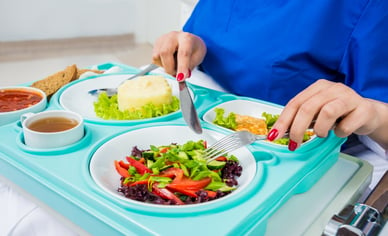When Michelin-starred chef Bruno Tison took over the foodservice program at Northwell Health, he encountered some unwelcome surprises.
At one of Northwell’s 21 New York City-area hospitals, he found packages of food that had expired 5 years previously. “Cases and cases and cases,” he told The Washington Post. Equipment was broken. Food waste approached 40%. And patients noticed: Emails and surveys described the food as “hardly edible” and “maybe the worst hospital food I’ve ever had.”
Here’s how Tison turned things around.
He recruited renowned chefs to help him adopt a restaurant-driven approach to hospital foodservice, collaborated with dietitians to ensure the new menus met patients’ nutritional needs and restrictions, replaced the freezers with refrigerators, and changed the standard hospital-tray production system to a restaurant-style system setup. New menus featured dishes such as mapo tofu, Thai basil chicken, and seared filet mignon.
The kicker: Food costs remained the same as before, thanks to dramatic reductions in waste. Because chefs were using fresh products, they ordered less (compared to packing the freezers).
Want to achieve a transformation like this one? Here are some healthcare foodservice innovations to inspire you.
Adopt a modern food-hall model.
Lancaster General Hospital in Pennsylvania had a fairly standard collection of dining options: a cafeteria, a convenience store, a sandwich/salad/soup café and a coffee kiosk. But hospital foodservice leaders weren’t satisfied with standard. As part of a larger renovation, they replaced all four outlets with Central Table Eatery, an inviting food hall that includes 12 healthy dining concepts with abundant local ingredients. Diners can choose sushi, bowls, sandwiches, salads, plated specials, and more. Pizza and burgers are the most popular options.
"It's an important part of the overall wellbeing and the respite that we're trying to provide to our staff, to our patients and to the visitors," CEO of Penn Medicine Lancaster General Health John Herman said. The transformation has boosted food revenue, too: retail sales have risen by about 67% and check counts have grown by 32% (compared to pre-COVID numbers). While staffing has increased, a system of 18 kiosks has sped the ordering process. For its innovative, community-focused approach, Central Table was named Best of Show in the 2023 FM Best Concept Awards program.
Create a signature dish.
At Woman’s Hospital in Baton Rouge, new moms get a special treat: the postpartum Patient Burger.
Executive Chef Paul Roberts puts love into every burger: “I season it with salt, pepper, garlic powder, onion powder and Montreal steak seasoning, then marinate the grilled burger in au jus so it doesn’t dry out,” he tells Foodservice Director. This technique allows staff to prepare burgers in batches, so they’re always ready to rush to a tired mom’s room. Complete with a slice of melted American cheese and all the fixings, the burger is served on a toasted brioche bun. The Patient Burger has proven so popular that people come off the streets to order it in the hospital’s cafeteria.
Get competitive.
Each year, the District of Columbia Hospital Association — a Washington D.C. advocacy organization — hosts a Healthy Hospital Initiative (HHI) Cooking Competition. Chefs from the organization’s 13 member hospitals compete to win awards in categories such as best entrée, best dessert, and taste and appearance.
The most recent competition upped the ante by requiring all entries to be vegan and to include the secret ingredient: carrots. Winning dishes included open-faced purple-carrot ravioli, carrot cilantro couscous salad, and carrot halwa pistachio trifle.
While the winners get trophies, cash and bragging rights, the benefits of the competition go further. It encourages a culture of innovation, challenging chefs to cook creatively within nutritional constraints.
Add Universal Meals to the menu.
Healthcare foodservice pros know how hard it is to accommodate patients’ complex dietary needs — not just their medical requirements, but also allergies, cultural preferences, and religious and ethical restrictions. The Physicians Committee for Responsible Medicine is trying to make it easier with the Universal Meals program.
Universal Meals is a collection of chef-developed, vegan recipes that are free of the top nine allergens, as well as gluten and alcohol. Some are labeled “thrifty,” which have a per-serving ingredient cost of $1 USD or less. And they’re anything but basic! Some spotlight recipes include truffled white bean soup, Japanese pasta salad with roasted kabocha squash, and Cajun quinoa with okra and tomato. The Universal Meals recipes are free to access and use; you can find them here.
Hamilton Beach Commercial is the trusted partner of healthcare foodservice operators around the world. From high-performance culinary blenders to vacuum chamber sealers to commercial juicers, our kitchen equipment helps you serve vibrant, healthful meals. Browse our full line of innovative foodservice solutions for healthcare.


